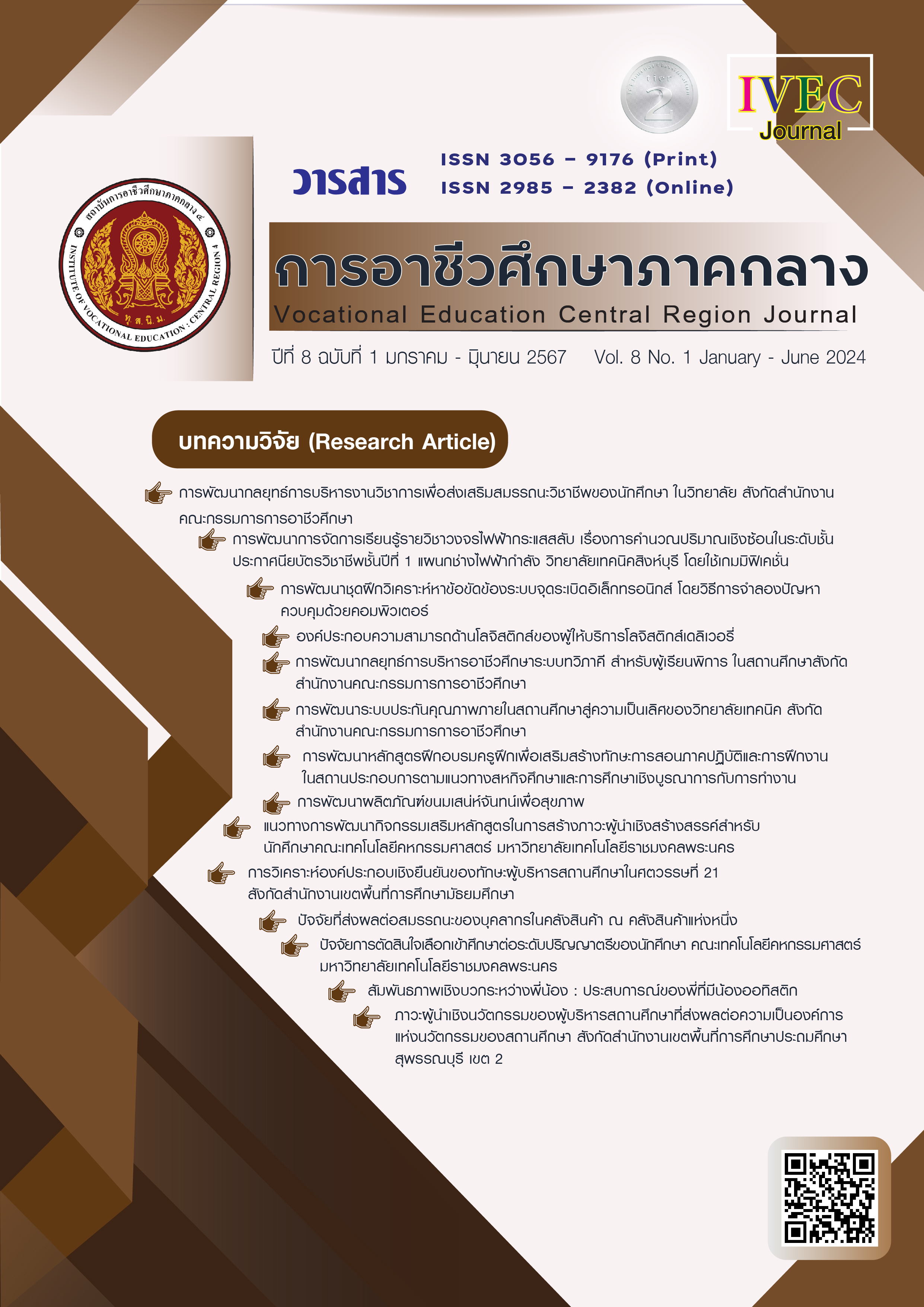Development of Academic Administration Strategies to Promote Professional Competency of Students in Colleges under the Office of the Vocational Education Commission
Main Article Content
Abstract
This research aimed to: 1) develop the academic affairs administration strategies to promote students’ professional competencies; and 2) certify the academic administration strategies to promote students’ professional competencies in colleges under the Office of the Vocational Education Commission. Mixed methods were applied and the research was divided into 2 phases as follows. Phase 1 was the development of academic affairs administration strategies to promote students’ professional competencies. The key informants were 10 directors, deputy directors of academic affairs, and experts in educational administration, derived by purposive sampling. Data were collected by an interview form and were analyzed by content analysis. The sample group consisted of 220 vocational colleges, derived by stratified random sampling, proportionally distributed according to region. The questionnaire respondents were directors, deputy directors of academic affairs, heads of curriculum development units, heads of measurement and evaluation units, and heads of bilateral vocational education units, totaling 1,100 persons. Data were collected using a questionnaire and were analyzed with frequency, percentage, mean, standard deviation, priority need index, as well as an analysis of strengths, weaknesses, opportunities, and threats using McKinsey’s 7S model, PEST model, and TOWS Matrix. In Phase 2, the certification of academic affairs administration strategies to promote students’ professional competencies, the informants were 9 directors, deputy directors of academic affairs, experts in educational administration, and teachers, derived by purposive sampling. Data were collected through connoisseur seminars and were analyzed by content analysis. As for strategy implementation, one vocational education institution was selected through purposive sampling based on the specified criteria to operate the developed strategies. The informants included 11 directors, deputy directors of academic affairs, and heads of program. Data were collected by reflection meeting and were analyzed by content analysis.
The research results showed that: 1. The academic affairs administration strategies to promote students’ professional competencies consisted of 5 strategies: 1) upgrading the curriculum development to promote students’ professional competencies; 2) organizing an integrated budgeting system to develop teachers’ competencies in organizing learning for unity; 3) adjusting the evaluation measurement system to be consistent with students’ competencies and economic, social, and spatial contexts; 4) accelerating the development of learning management innovations that integrate technology in line with the economy and society; and 5) enhancing network cooperation in professional practice to develop students’ professional competencies. 2. The academic affairs administration strategies to promote students’ professional competencies were approved by consensus, indicating that they were accurate, appropriate, useable, and beneficial. The results of strategy implementation showed that: In Strategy 1, the college set guidelines for putting competency-based curriculum of all professions into practice. In Strategy 2 the college prepared a teacher competency development plan by integrating budgets from all sections in unity. In Strategy 3, the college specified guidelines and organized authentic measurement and assessment of learning achievement according to quality criteria. In Strategy 4, the college planned to promote personnel to gain knowledge, skills, and expertise in innovative media development and creative learning management. In Strategy 5, the college enhanced the cooperative network for learning with private establishmentsand communities around the college.
Article Details

This work is licensed under a Creative Commons Attribution-NonCommercial-NoDerivatives 4.0 International License.
|
บทความ ข้อมูล เนื้อหา รูปภาพ ฯลฯ ที่ได้รับการตีพิมพ์ในวารสาร การอาชีวศึกษาภาคกลาง ถือเป็นลิขสิทธิ์ของวารสารการอาชีวศึกษาภาคกลางหากบุคคลหรือหน่วยงานใดต้องการนำทั้งหมดหรือส่วนใดส่วนหนึ่ง ไปเผยแพร่ต่อหรือเพื่อกระทำการใด ๆ กองบรรณาธิการไม่สงวนสิทธิ์ ในการคัดลอกบทความเพื่อการศึกษาแต่ให้อ้างอิงแหล่งที่มาให้ครบถ้วน สมบูรณ์ สงวนสิทธิ์ โดย สถาบันการอาชีวศึกษาภาคกลาง 4 ที่ตั้ง 90 ถนนเทศา ตำบลพระปฐมเจดีย์ อำเภอเมือง จังหวัดนครปฐม โทรศัพท์ 034 242 856 , โทรสาร 034 242 858 ISSN : 3056-9176 (print) ISSN : 2985-2382 (online) |
References
กรรัตน์ พิพัฒน์ผล. (2557). องค์ประกอบความสำเร็จของการจัดการอาชีวศึกษาในสถานประกอบการขนาดใหญ่. วิทยานิพนธ์ ปริญญาศึกษาศาสตรดุษฎีบัณฑิต สาขาวิชาการศึกษาตลอดชีวิตและการพัฒนามนุษย์ บัณฑิตวิทยาลัย มหาวิทยาลัยศิลปากร.
ชัยยุทธ์ ปัญญาสวัสดิ์สุทธิ์. (2563). ไทยไม่ได้ขาดแคลนงบการศึกษา แต่ปัญหาคือการใช้จ่าย. ค้นเมื่อ ตุลาคม 9, 2566, จาก https://www.eef.or.th/interview-chaiyuth/
ชุมพล คำเทียน. (2566, กรกฎาคม-ธันวาคม). การพัฒนากลยุทธ์การบริหารงานวิชาการ เพื่อส่งเสริมทักษะในศตวรรษที่ 21 ของนักศึกษาสถาบันการอาชีวศึกษา. การอาชีวศึกษาภาคกลาง, 7, (2), หน้า 23-32.
นรเศรษฐ์ มุนีรักษา และ นันทรัตน์ เจริญกุล. (2564, มกราคม - เมษายน). การศึกษาความต้องการจำเป็นของการบริหารโรงเรียนอาชีวศึกษา จังหวัดนนทบุรี ตามแนวคิดการเป็นผู้ร่วมสร้างสรรค์นวัตกรรม. มนุษยศาสตร์และสังคมศาสตร์ มหาวิทยาลับราชพฤกษ์, 7, (1), หน้า 90-103.
นิติ นาชิต. (2565). กลยุทธ์การเสริมสร้างความเข้มแข็งการจัดการเรียนรู้อาชีวศึกษาด้านธุรกิจและบริการด้วยเทคโนโลยีดิจิทัล. วารสารการอาชีวศึกษาภาคกลาง, 6, (1), หน้า 10–23.
พิทักษ์ กาวีวน, นิภาพร บินสัน, วิรัตน์ ปุ๋ยกระโทก, พรศักดิ์ ชูขาว, อังคาร อยู่ลือ, กิตติมา มุ่งวัฒนา, ธีมาพร แก่นคํา, และ วสันต์ สุทธาวาศ. (2565, กรกฎาคม-ธันวาคม). การพัฒนารูปแบบชุมชนนวัตกรรมการจัดการเรียนรู้แบบเชิงรุกเพื่อส่งเสริมทักษะที่จำเป็นแห่งอนาคตของผู้เรียน. ชุมชนแห่งการเรียนรู้วิชาชีพครู, 2, (2), หน้า 201 - 214.
สิทธิศักดิ์ เพิ่มพูล และ พัชรี ศิลารัตน์. (2566, มกราคม-มิถุนายน). รูปแบบการพัฒนาสมรรถนะวิชาชีพผู้เรียนด้วยความร่วมมือกับภาคีเครือข่ายวิทยาลัยเทคนิคเกษตรวิสัย. พุทธปรัชญาวิวัฒน์, 7, (1), หน้า 686-697.
Ananiadou, K, & Claro, M (2009). 21st century Skills and competences for new for Millennium learners in OECD countries. France: OECD.
Riyanda, A.R., Jalinus, N., Abdullah, R., Ranuharja, F., Islami, S., Adi, N.H., & Aminuddin, F.H. (2022). The New Paradigm of Technical and Vocational Education and Training (TVET). JURNAL ILMU PENDIDIKAN, 4, (1), pp. 364–371.
Rosina, H, Virgantina, V., Ayyash, Y., Dwiyanti, V., & Boonsong, S. (2021). VOCATIONAL EDUCATIONCURRICULUM: BETWEEN VOCATIONAL EDUCATION AND INDUSTRIAL NEEDS. ASEAN Journal of Science and Engineering Education, 1, (2), pp. 105-110.


